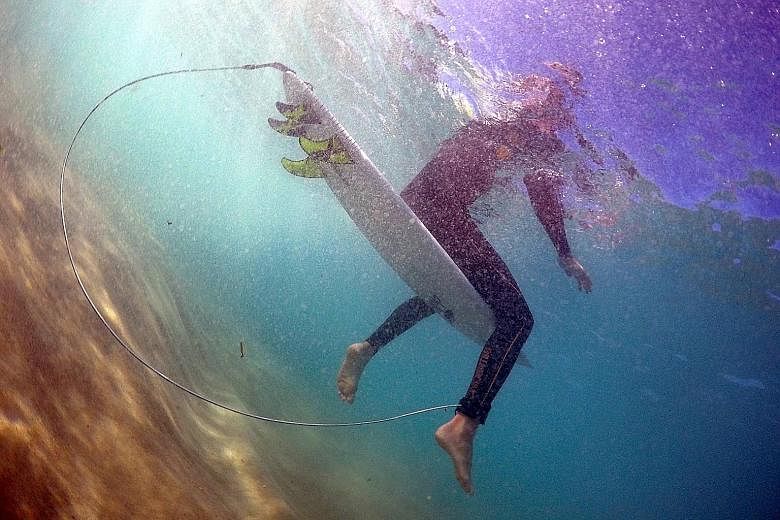A spate of shark attacks on Australia's east coast has prompted the most populous state of New South Wales (NSW) to consider introducing a shark-tracking phone app and electronic underwater shark repellents.
The new cutting-edge technologies will be examined at a shark summit in Sydney today, which was arranged by the state government following a series of attacks which has kept tourists and surfers out of the water at some of the country's most popular beaches.
The state has convened about 70 experts from around the world to discuss solutions and present approaches adopted in other places notorious for sharks, such as South Africa and Hawaii.
The technologies to be examined include a shark-detecting buoy which can send a text message to lifeguards when predators are detected approaching the shore.
Another option is a flexible plastic wall that can be placed underwater near beaches to prevent sharks from getting too close. The walls have openings about 30cm wide but - unlike nets - allow smaller creatures to swim in and out without the risk of entanglement.
The state minister for primary industries, land and water, Mr Niall Blair, said the summit would consider existing and emerging technologies and propose options to be trialled at beaches this summer.
"The world's best scientists will… discuss a number of new technologies to be trialled in NSW waters, which will inform advice to the NSW government on additional measures," he said in a statement on Sunday.
At least 13 attacks have occurred in New South Wales this year, compared with just three last year. The attacks included the death in February of Mr Tadashi Nakahara, a 41-year-old Japanese surfer who was believed to have been mauled near the shore by a great white shark.
Experts have proposed various explanations for the recent increase in shark attacks, including changing ocean temperatures and greater numbers of humans entering the water. Another theory is that greater numbers of whales migrating along the east coast have attracted deadly great whites.
Professor Colin Simpfendorfer, a marine scientist at James Cook University who is due to speak at the Sydney summit, said he could not rule out any of these theories, but would not offer an explanation.
"We don't understand these things very well," he told The Straits Times yesterday.
"As a scientist, I don't really have a theory as to why (there has been an increase). It is a very information-poor situation. There is very little evidence to suggest any of (these theories) are the cause of what we are seeing in New South Wales."
Prof Simpfendorfer said there was probably "no simple solution" to prevent attacks but supported efforts by the government to try to find a response and allay public fears about swimming at the beach.
"They are such rare events, so it is hard to get good science on this," he said. "That is where we are really struggling… We don't have poor information about the ecology of sharks, but we are information-poor about shark-human interaction."
The authorities in New South Wales have been tagging sharks to monitor their movements, but cannot currently provide real-time tracking for the public.
The researchers at the summit, to be held at Sydney's Taronga Zoo, will discuss the possibility of transmitting shark movements to a base and then publishing the data on a specially-made app or website.
Despite the recent rise in attacks, the public has tended to oppose measures such as culls, which can endanger sharks and other marine life.
Research released by the University of Sydney yesterday found that 80 per cent of residents in the northern New South Wales region of Ballina - where there have been numerous attacks and sightings - oppose lethal responses such as culls or traps.
"For three years, I have looked across Australia for public sentiment to match the political dialogue that supports lethal nets, culls, hunts and drum lines, but the reality is that these options are now out of touch with the public," said Dr Christopher Neff, the lead researcher.
Last year, the state of Western Australia conducted a controversial cull, in which about 70 sharks were shot.

